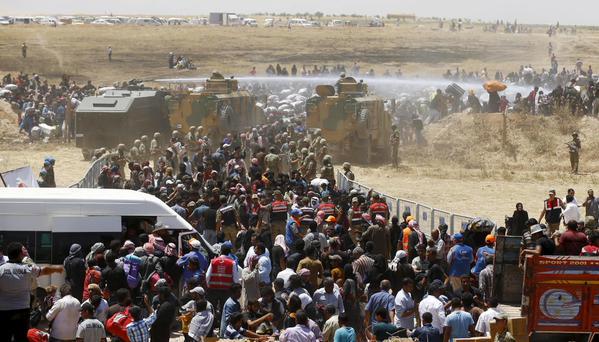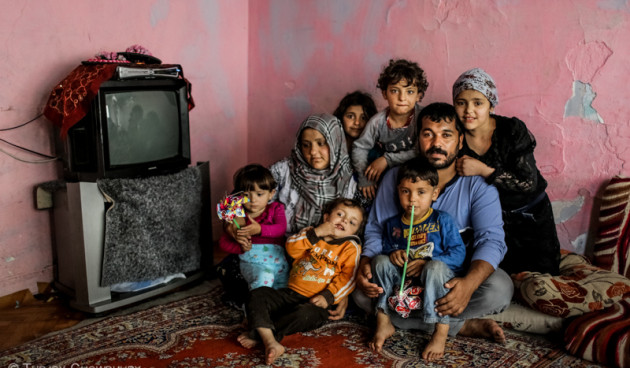How the EU and Turkey are putting Syria’s refugees at risk
On March 24, one of the main broadsheet newspapers in Denmark, Politiken, ran a major article, “The EU Pays for A Wall of Surveillance Where Turkey ‘Protects’ Refugees of War”. The investigation establishes how European Union funding is helping Turkey barricade its border, leaving desperate Syrians — attempting to flee the brutal ongoing war in their home country — with few options. Those who still attempt to flee now risk death from Turkish soldiers firing on them.
Six days after the Politiken article, Israeli forces shot Palestinian demonstrators on the Gaza border participating in the “Great March of Return”, killing 18 and wounding more than 1,400, including almost 800 by live fire.
But whereas newspapers around the world highlighted the Israeli shootings, almost none of them have noted the possibility of attacks on would-be Syrian refugees in a Turkish arrangement supported by money from the EU, a supposed bastion of norms and values.

Displaced Syrians at a closed Turkish border, June 2015
Dealing Away Refugee Rights
In March 2016 the EU’s 28 heads of state signed a deal with Turkey that tries to prevent smuggled migrants and asylum seekers from travelling across the Aegean Sea from Turkey to the Greek Islands. The agreement allows Greece to return to Turkey all new undocumented migrants. This is a transformation of human beings into what Boaventura de Sousa Santos and Achille Mbembe refer to as subhumans or nonhumans – political currency in which their rights are exchanged for the short-sighted gains of others.
Syria’s internationalized war is now in its seventh year. Lebanon and Jordan have taken in more than 1,656,000 refugees, but they refuse to admit any more. Turkey has erected a concrete wall along its border, equipped with heat-detection cameras. Since September 2017, at least 42 people have died trying to cross the border wall.
The Turkish government has been provided with security and surveillance technology, worth more than 80 million Euros, by European governments. “Ultimately, it will ensure the safety of Europe’s citizens,” the EU Commission said. “Refugees must be kept away from the EU.”
Other funds are being diverted from economic cooperation to the constraints on refugees. The Turkish company Otokar has been granted 35.6 million Euros by the EU under a regional development program to support the improvement of the environment and transport, including rail infrastructure and ports, and to promote convergence with the EU by enhancing the competitiveness of the Turkish economy and reducing regional socio-economic disparities. But the money is being used to patrol the border with Syria, with the provision of armored Cobra II military vehicles. Another 30 millions Euros is going to armored and non-armored surveillance vehicles. And 18 million Euros has gone towards the Dutch manufacture of six patrol boats for the Turkish coast guard.
We are experiencing a serious crisis in Europe’s ethical foundations, with border practices pressuring refugees and asylum seekers to die at the Turkish-Syrian frontier as they flee persecution at home.
The European Court of Auditors is currently examining whether the “Facility for Refugees in Turkey” — with 1 billion Euros from the EU budget and 2 billion Euros from contributions of members states — is providing effective support for refugees hosted in Turkey. The Court should urgently extend its investigation and audit with a thorough examination of the deaths at the border and the complicit involvement of EU member states. Given this expenditure of European taxpayers’ money, this is a justified demand on democratically-elected representatives in member governments and in the European Parliament.
Editor’s Note: Researchers for Peace have set up an online pledge form for “all scientists, academics and researchers to call on the European Union to stop funding military research programs”.


Dear Kazemi, have you read this: https://www.nytimes.com/2018/04/09/world/middleeast/israel-palestinians-gaza-video.html
If the Israeli shooting resulted in 18 deaths and 800 injured, then it is clear that the Israelis did not “shoot to kill”. Otherwise the death toll would be about 1/3 of the casualties, and not just about 2%.